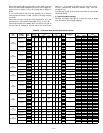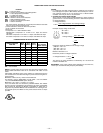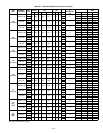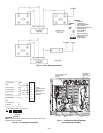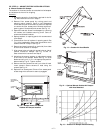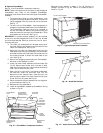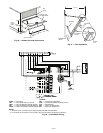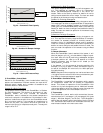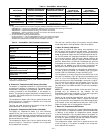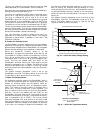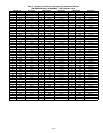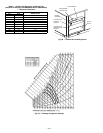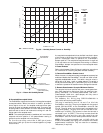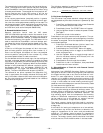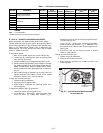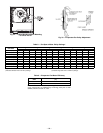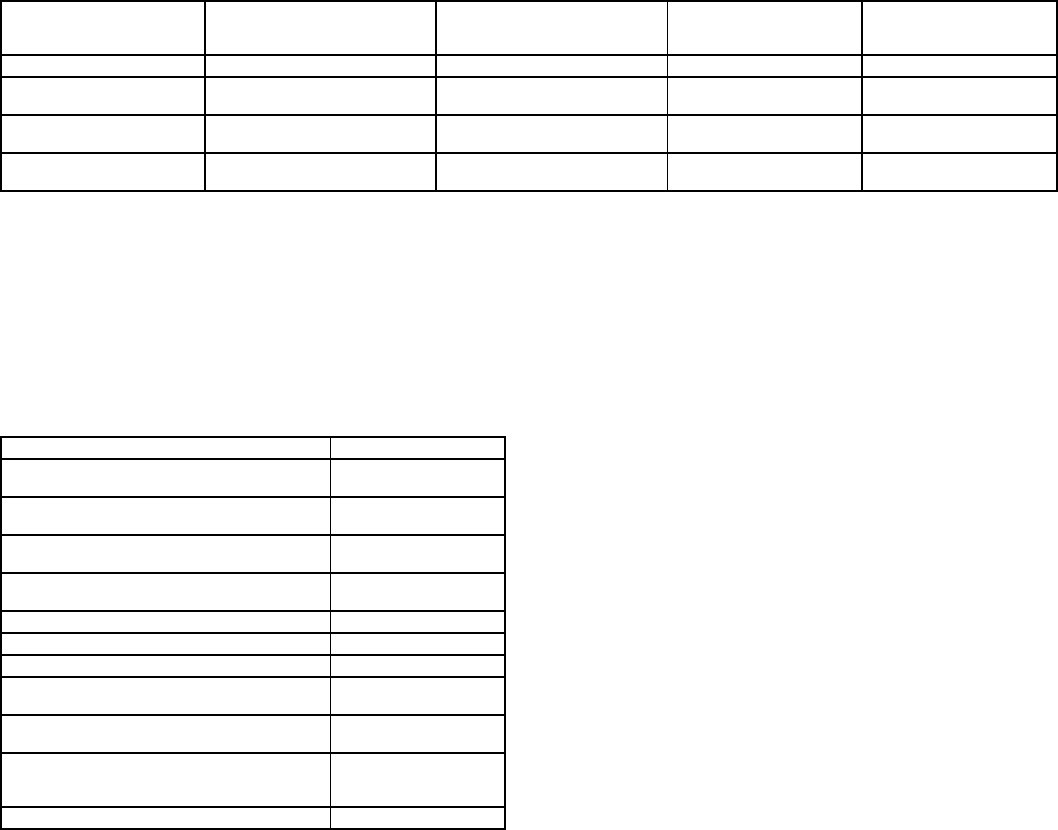
—21—
Table 3 — EconoMi$er+ Sensor Usage
NOTES:
1. CO
2
Sensors (Optional, 5-Pin sensor wiring plug CRE+PLUG001A00 required for installation.).
33ZCSENCO2 — Room sensor (adjustable). Aspirator box is required for duct mounting of the sensor.
33ZCASPCO2 — Aspirator box used for duct-mounted CO
2
room sensor.
33ZCT55CO2 — Space temperature and CO
2
room sensor with override.
33ZCT56CO2 — Space temperature and CO
2
room sensor with override and set point.
CRCBDIOX002A00 — Return air CO
2
sensor.
2. All units include the following Standard Sensors:
Outdoor-Air Sensor — set point adjustable from 45 F to 70 F, factory set at 65 F.
Supply-Air Sensor — set point adjustable from 40 F to 65 F. Factory set at 55 F.
All temperature adjustments are made at the EconoMi$er+ controller.
Table 4 — EconoMi$er+ Field-Installed Accessories
*5-pin sensor wiring plug accessory (P/N CRE+PLUG001A00) is
required to install IAQ sensor.
G. Outdoor Air Temperature (OAT) Sensor (Provided)
The outdoor air temperature sensor is a 10K thermistor used
to measure the outdoor-air temperature. The sensor controls
EconoMi$er+ changeover and compressor lockout. The sensor
is factory-installed on the EconoMi$er+ in the outdoor air-
stream. The operating range of temperature measurement is
0° to158 F. See Tables 5 and 6 for thermistor resistance and
resolution values.
The temperature sensor looks like an eyelet terminal with
wires running to it. The sensor is located in the “crimp end”
and is sealed from moisture.
The user can read the value of the sensor using the Read
mode, described in the Start-Up section.
H. Supply Air Temperature (SAT) Sensor (Provided)
The supply air temperature sensor is a 10K thermistor
located at the inlet to the indoor fan. This sensor must be
field installed. The operating range of temperature measure-
ment is 0° to158 F. See Tables 5 and 6 for thermistor resis-
tance and resolution values.
The temperature sensor looks like an eyelet terminal with
wires running to it. The sensor is located in the “crimp end”
and is sealed from moisture.
The user can read the value of the sensor using the Read
mode, described in the EconoMi$er+ Controller section.
I. Indoor Air Quality (IAQ) Sensor
Any indoor air quality or CO
2
sensor that provides a 4 to
20 mA output can be used as the IAQ sensor. The controller
will modulate the outdoor-air damper to provide ventilation
based on the sensor output and the IAQ setting of the control-
ler. The CO
2
sensor will modulate the outdoor-air damper from
the minimum position (IAQ minimum damper position set
point) to the maximum position (occupied minimum damper
position). When there is no CO
2
call, the damper will go to the
unoccupied minimum position. When there is a CO
2
call, the
damper will be between the IAQ minimum economizer set
point position and the occupied minimum damper position.
Mount the sensor according to manufacturer specifications.
In order to wire this sensor, an accessory 5-pin plug (part
number CRE+PLUG001A00) is required. See Fig. 22.
The IAQ sensor is wired to the ground and IAQ wires in the
harness. The accessory 5-pin wiring plug is connected to pins
13-17 of J3 on the EconoMi$er+ controller. Push the plug
down onto the pins of the EconoMi$er+ controller to install.
Pins 13 and 14 are used for the IAQ sensor. Pins 15-17 are
used for the field-installed remote potentiometer. Connect
the IAQ sensor to the BRN and WHT wires of the accessory
5-pin plug.
NOTE: Pin numbers are not shown on the controller. They are
provided only as reference for the installer. On the
EconoMi$er+ board, they numbered 1-17 from left to right, but
only the 1 and the 17 are printed on the board.
Sensor wiring should be extended with wire and wire nuts
and routed to the IAQ sensor location. Adjust the IAQ set-
ting at the controller to correspond to the IAQ voltage output
of the sensor at the user-determined set point. See Fig. 26.
Power the sensor with a field-supplied transformer.
J. Return Air Temperature (RAT) Sensor
The EconoMi$er+ controller will accept input from the acces-
sory 10K return air temperature sensor (CRTEMPSN001A00)
in addition to the outdoor air temperature sensor shipped
with the EconoMi$er+. By using both sensors, the outdoor air
and the return air temperatures are compared (differential
dry bulb) for optimal energy savings. See Tables 5 and 6 for
thermistor resistance and resolution values.
The temperature sensor looks like an eyelet terminal with
wires running to it. The sensor is located in the “crimp end”
and is sealed from moisture.
APPLICATION
STANDARD OUTDOOR AIR
TEMPERATURE SENSOR
ACCESSORY RETURN AIR
TEMPERATURE SENSOR
ACCESSORY
OUTDOOR AIR
HUMIDITY SENSOR
ACCESSORY INDOOR
RETURN AIR
HUMIDITY SENSOR
Standard Unit Included — HH79NZ039 — — —
Differential
Dry Bulb
Included — HH79NZ039
Required —
CRTEMPSN001A00
——
Outdoor Air
Enthalpy
Included — HH79NZ039 —
Required —
CRHUMDSN001B00
—
Differential Enthalpy Included — HH79NZ039
Required —
CRTEMPSN001A00
Required —
CRHUMDSN001B00
Required —
CRHUMDSN001B00
DESCRIPTION PART NUMBER
7
1
/
2
-12
1
/
2
Ton Power Exhaust
208-230 v 1 Ph
CRPWREXH022A00
7
1
/
2
-12
1
/
2
Ton Power Exhaust
460 v 3 Ph
CRPWREXH023A00
Return Air Temperature Sensor with
Harness
CRTEMPSN001A00
Outdoor Air Humidity Sensor with
Harness
CRHUMDSN001B00
Indoor Air Humidity Sensor w/Harness CRHUMDSN001B00
Return Air CO
2
Sensor CRCBDIOX002A00*
CO
2
Room Sensor 33ZCSENCO2*
Aspirator Box for Duct Mount
CO
2
Sensor
33ZCASPCO2
Space Temperature and CO
2
Room Sensor with Override
33ZCT55CO2*
Space Temperature and CO
2
Room Sensor with Override
and Set Point
33ZCT56CO2*
5-Pin Sensor Wiring Plug CRE+PLUG001A00*



